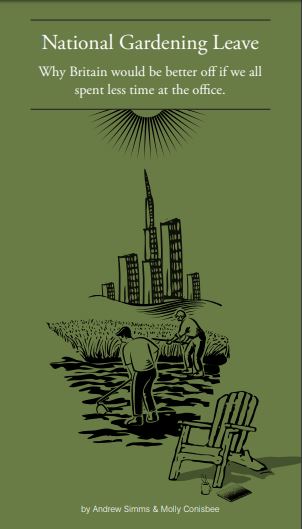How often are ideas that once seemed radical and to some, even preposterous, made tame by the turn of events? That is the case now with the suggestion that Britain should experiment with National Gardening Leave, an idea suggested in a 2012 pamphlet I wrote with my colleague, the academic Molly Conisbee. It called for an experiment in shortening the working week and for the greening of our towns and cities.
At the time economies were in the deep shadow of the financial crisis and awareness of the severity of the climate emergency was rising. The challenge then, as now, was how life could change to lower our environmental impacts, make towns and cities more resilient in the face of climatic upheaval, and rebalance our economies and working lives toward greater human well being.
Now, in the grip of a global pandemic we are in a situation that no one would have chosen. For all but key workers and essential services there has been a mass shift to home working for those who can do so. Those who cannot are left in perilous situations with the threat or reality of unemployment or no pay as normal economic functions halt. Whilst the government in the UK has intervened to support wages and businesses, the pace and nature of the interventions still leaves workers and firms exposed.
With millions living under lockdown, urban green space is being appreciated as a lifeline like never before. We need more of it.
More can and needs to be done to secure the basic material security and livelihoods of the nation. But the reasons that we argued for National Gardening Leave in 2012 still apply. And, today, with millions living under lockdown, urban green space is being appreciated as a lifeline like never before. We need more of it. Looking ahead to recovery, if we can embed a basic livelihood guarantee, sharing out more equitably available work will not only be a powerful help, it help reorient the economy to put health, well being and more balanced working lives at its core. One great lesson from the pandemic is, after all, that health and well-being takes priority.
This is how we introduced National Gardening Leave:
This pamphlet argues that Britain would be better off if we all
spent less time at the office. It makes the case for a new, voluntary
scheme to introduce a shorter working week. We call this
National Gardening Leave. The proposal calls for adapting a wide
range of available spaces for the rapid expansion of gardening,
both productive and aesthetic, in Britain’s towns and cities.
We argue that this would make people happier and healthier.
It would make the economy more resilient, better positioned
for the challenges of the modern world, and better protected
from external food and energy price shocks. It would also make
communities stronger and more convivial places to live.















